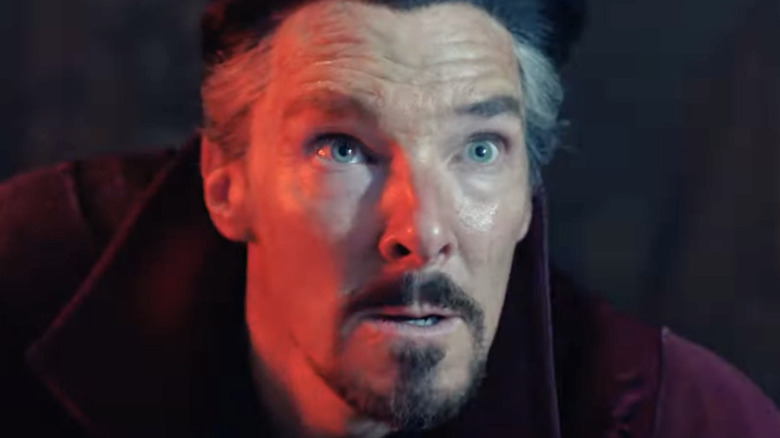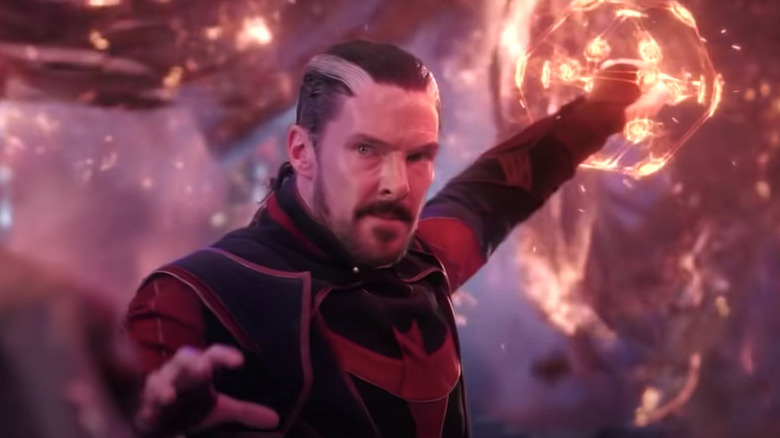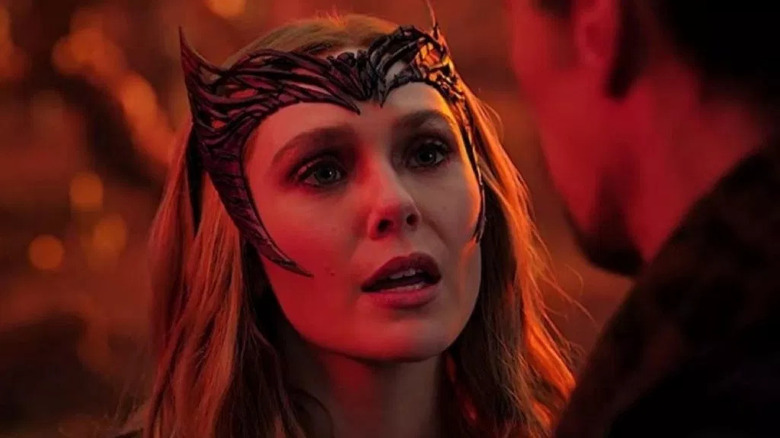Doctor Strange In The Multiverse Of Madness Revealed A Terrifying Truth About Dreams In The MCU
Contains spoilers for "Doctor Strange in the Multiverse of Madness"
For much of its runtime, "Doctor Strange in the Multiverse of Madness" is exactly the kind of fever dream only the combination of Sam Raimi's horror sensibilities and the trippiest big-budget corner of the Marvel Cinematic Universe can deliver. Though Doctor Strange (Benedict Cumberbatch) and his various allies and antagonists face plenty of oddness and terror in cold daylight, dreams are a surprisingly big part of the movie. In fact, some of the movie's creepiest moments come when powerful magic users deploy a technique called dreamwalking to possess their alternate universe counterparts.
Dreamwalking is a dangerous Darkhold technique that wreaks havoc on both the user and, it seems, everyone in their vicinity. When Darkhold-corrupted Wanda Maximoff (Elizabeth Olsen) overwhelms her Illuminati universe variant, she becomes an even more implacable, unstoppable horror movie monster than she is during her fight with Kamar-Taj, easily tearing her way through the Illuminati's defenses ... and killing the vast majority of the group in increasingly inventive, grim ways. Later, Strange manages to make dreamwalking even more horrifying when he possesses the dead body of his variant, harnesses the power of lost souls, and attacks Wanda as a zombie wizard with an army of dark spirits.
Both of these sequences are as grim as they're exciting. Yet, somehow, these elaborate Raimi moments aren't even the scariest dream-related revelation the movie has in store. See, "Doctor Strange in the Multiverse of Madness" almost casually reveals the truth about the nature of dreams in the MCU ... and the truth is nothing short of terrifying.
In the MCU, your dreams actually happen to you somewhere in the multiverse
Even Sorcerers Supreme old and new can learn new things, and when multiverse-traversing America Chavez (Xochitl Gomez) tells Strange and Wong (Benedict Wong) that the dream the former was having was actually real to the Strange variant who died in the opening scene of the movie, they're somewhat taken aback by the news. In fact, Wong is pretty concerned when he finds out that his dream of being chased by a clown in a tragically undressed state has actually happened to some poor Wong variant out there. Near the end of the movie, the current Sorcerer Supreme has a short discussion about happiness with Strange, and confides that he has been known to think about his other lives on occasion. Chances are, the poor Wong variant who keeps misplacing his clothes while running from creepy clowns is one of the lives Earth-616 Wong will think a lot about after the movie, whether he wants to or not.
Because the whole "your dreams are real" concept apparently isn't unnerving enough on its own, the movie also gives a very concrete example of a common bad dream, and how it might play out in the MCU multiverse. When Doctor Strange encounters a Darkhold-corrupted variant of himself who has a rather questionable hobby of killing alternate-universe Stranges, the variant almost casually reveals that most dreams of falling that the main Strange has ever had were likely caused by the Darkhold Strange killing other Strange variants in ways that, presumably, involve great heights.
Not all multiverse dreams, of course, are nightmares ... but that doesn't mean they're any less heartbreaking. For instance, Wanda is able to confirm the multiversal existence of her supposedly nonexistent children because she keeps dreaming of them.
The potential implications of the multiversal nature of dreams
Given that the majority of the movie's characters are magic users, multiverse experts, of both, there's a chance that the whole "your dreams are actually happening to another version of you" thing might be exclusive to people who are in tune with the strange, unseen forces that govern the magical side of the MCU. However, as long as that's not clear, the viewer can't help but think that every single bad dream a character's ever had in the MCU is just a vision of their variant having a really, really bad time.
This, by proxy, implies that the MCU is an even wilder place than you've seen so far — which is saying something, considering that "Doctor Strange in the Multiverse of Madness" alone introduces viewers to things like an animated universe and some sort of cubist nightmare universe. Every time the mega-franchise's heroes and villains go to sleep and dream the uneasy dreams their stressed brains no doubt conjure up, they're actually watching the wild and awful adventures of their multiversal variants.
That's just the super-folks, too. If the same applies to the billions of people living on Earth alone — let alone the other people in the MCU, such as the Skrulls and the Kree — this means that any and all truly mind-boggling dreams these countless people are able to conjure up are on the table. Imagine how many truly weird dreams fit in there, and what kind of odd universes they might reveal. It's entirely possible that by this simple dream revelation alone, the MCU has stealthily opened the door to stories that are so weird, they make even "Doctor Strange in the Multiverse of Madness" look like a walk in the park.


